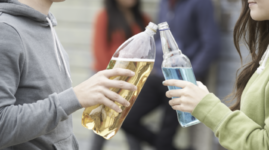Offences Relating to Underage Drinking in New South Wales

It’s not uncommon for Australians to have their first drop of alcohol whilst under the age of 18 years old. However, many young people (and their parents) aren’t aware of the potential criminal consequences that could apply to situations of underage drinking.
Below outlines the offences that could apply to the consumption of alcohol by minors, including relevant offences for parents and guardians as well as licensed premises.
Offences that apply to minors
Although there are no offences which apply to minors consuming alcohol in a private place, there are offences which apply to public venues.
Under section 118 of the Liquor Act 2007, it is an offence for a person under the age of 18 years to:
- consume liquor on licensed premises, or
- consume liquor on the premises of an unlicensed restaurant unless the minor consumes the liquor in the company of, and with the permission of, his or her parent or guardian, or
- obtain, or attempt to obtain, liquor for consumption on licensed premises, or
- carry liquor away, or attempt to carry liquor away, from licensed premises unless the minor was ordered or requested by another person to carry the liquor away from the licensed premises.
This offence carries a maximum penalty of a fine of $2,200.
The Act also has an offence under section 129 of the Act relating to the use of fake IDs by minors to obtain alcohol, carrying a maximum penalty of a fine of $2,200.
Under section 11 of the Summary Offences Act 1988, a person under the age of 18 years is guilty of an offence if they possess or consume any liquor in a public place, unless the person establishes that:
- They were under the supervision of a responsible adult, or
- They had a reasonable excuse for possessing or consuming the liquor.
A ‘public place’ is a place that is open to the public, or is used by the public whether or not on payment of money or other consideration, whether or not the place or part is ordinarily so open or used and whether or not the public to whom it is open consists only of a limited class of persons, but does not include a school.
This offence carries a maximum penalty of a fine of $2,200.
Offences for supplying alcohol to a minor when not parent/guardian
The term ‘secondary supply’ refers to the purchase of alcohol by an adult and subsequent supply to a person under the age of 18 years old.
The secondary supply of alcohol to a minor if you are not that minors parent or guardian is an offence whether in licensed premises, under section 117(2) of the Liquor Act 2007, or an unlicensed premises under section 117(4) of the Act, is an offence. Both offences carry a maximum penalty of a fine of $11,000 or 12 months imprisonment or both.
Obtaining liquor from a licensed premises for the purposes of supplying to minors is also an offence under section 117(6) of the Act, carrying a maximum penalty of a fine of $11,000 or 12 months imprisonment or both.
It is also an offence under section 118(2) of the Act to send a minor to a licensed premises for the purposes of obtaining alcohol. This carries a maximum penalty of a fine of $3,300.
Offences for supplying alcohol to a minor if a parent/guardian
It is not illegal in New South Wales for a parent or guardian to supply alcohol to a minor in a private premises (such as the family home) if it is “consistent with the responsible supervision of the minor”.
Factors that will be taken into account in determining responsible supervision are noted under section 117 of the Liquor Act, including:
- the age of the minor,
- whether the person supplying the liquor to the minor is intoxicated,
- whether the minor is consuming the liquor with food,
- whether the person supplying the liquor is responsibly supervising the minor’s consumption of the liquor,
- the quantity and type of liquor supplied and the period of time over which it is supplied,
A parent or guardian supplying liquor to minors in an irresponsible manner (particularly if the minor is intoxicated) could be guilty of an offence under section 117(4) of the Act which carries a maximum penalty of a fine of $11,000 or 12 months imprisonment or both.
An offence under section 120 of the Act also exists if a responsible adult allows a minor to consume alcohol on a licensed premises. This offence carries a maximum penalty of a fine of $3,300.
An offence also exists under section 125 of the Act for a responsible adult who leaves a minor unaccompanied in a licensed premises, this carries a maximum penalty of a fine of $3,300.
Offences for selling alcohol to a minor
There are also a number of offences which apply to operators of licensed premises which sell or supply alcohol to a person under the age of 18. These include:
- Selling liquor to a minor under section 117(1) of the Liquor Act, carrying a maximum penalty of a fine of $11,000 or 12 months imprisonment or both.
- Supplying liquor to a minor under section 117(2) of the Act, carrying a maximum penalty of a fine of $11,000 or 12 months imprisonment or both.
- Allowing liquor to be sold or supplied to a minor in a licensed venue under section 117(8) of the Act, carrying a maximum penalty of a fine of $11,000 or 12 months imprisonment or both.
- Allowing a minor to sell or supply liquor to others in a licensed venue under section 119 of the Act, carrying a maximum penalty of a fine of $5,500.
- Allowing a minor to enter certain restricted areas of licensed premises (such as a small bar area) under section 124 of the Act, carrying a maximum penalty of a fine of $5,500.*
- Allowing a minor to enter restricted licensed premises under section 126 of the Act, carrying a maximum penalty of a fine of $5,500.*
*Exceptions exist if functions for minors are provided in the licensed venue.
Going to court for an alcohol-related offence?
If you have been charged with an alcohol-related offence, call Sydney Criminal Lawyers anytime on 9261 8881 to arrange a free first conference during which one of our experienced criminal defence lawyers will advise you of your options and the best way forward, and fight for the optimal outcome.
Receive all of our articles weekly
Related Articles
RELATED LEGISLATION
- Section 118 Liquor Act 2007 | Consumption of Alcohol by Minor
- Section 11 Summary Offences Act 1988 | Possession of Liquor by Minors
- Section 129 Liquor Act 2007 | Minors Using False Identification
- Section 117 Liquor Act 2007 | Selling and Supplying Liquor to Minors
- Section 120 Liquor Act 2007 | Adult Allowing Consumption on Licensed Premises
- Section 125 Liquor Act 2007 | Responsible Adult Not to Leave Minor Unaccompanied
- Section 119 Liquor Act 2007 | Allowing Minor to Sell or Supply Liquor
- Section 124 Liquor Act 2007 | Licensee Not to Allow Minor to Attend Premises
- Section 126 Liquor Act 2007 | Minors Must be Refused Entry to Licensed Premises






